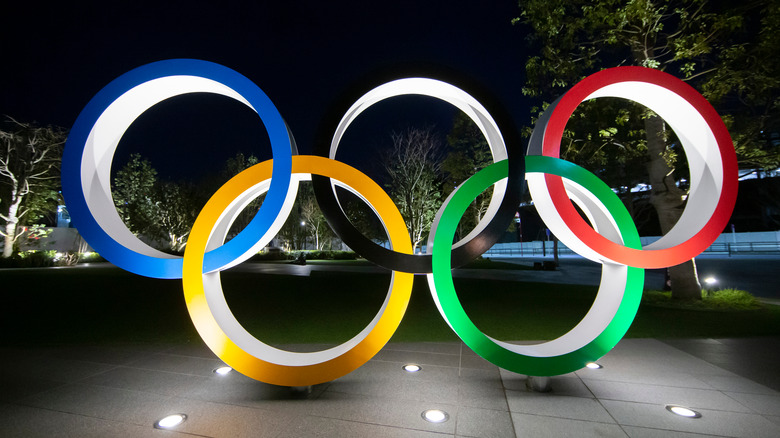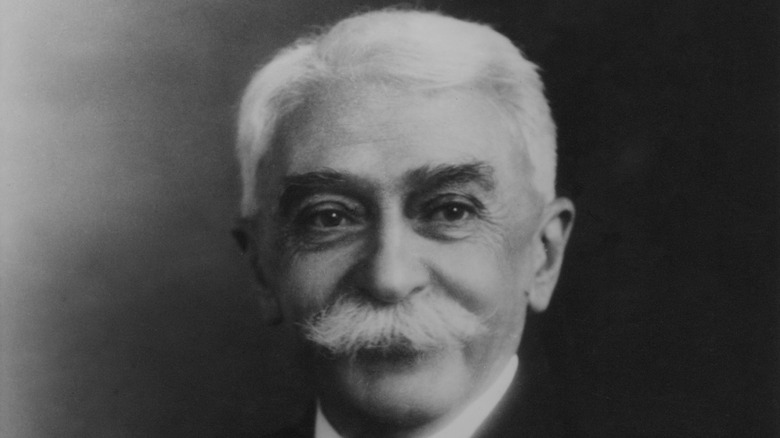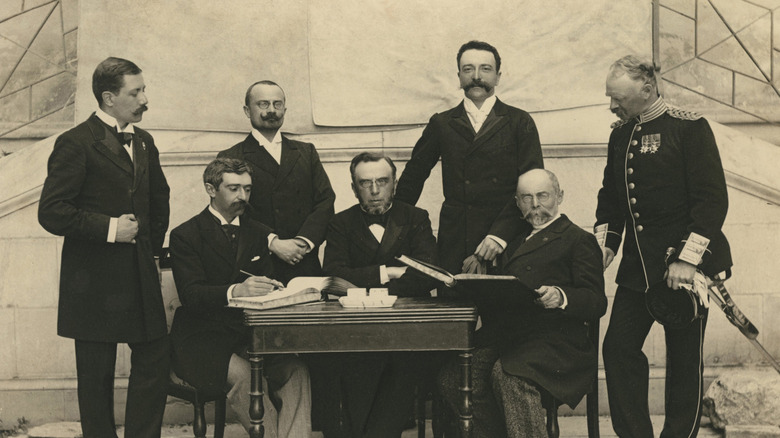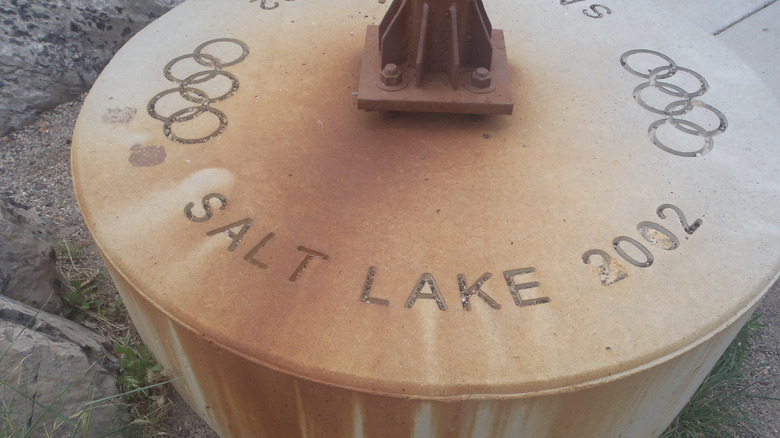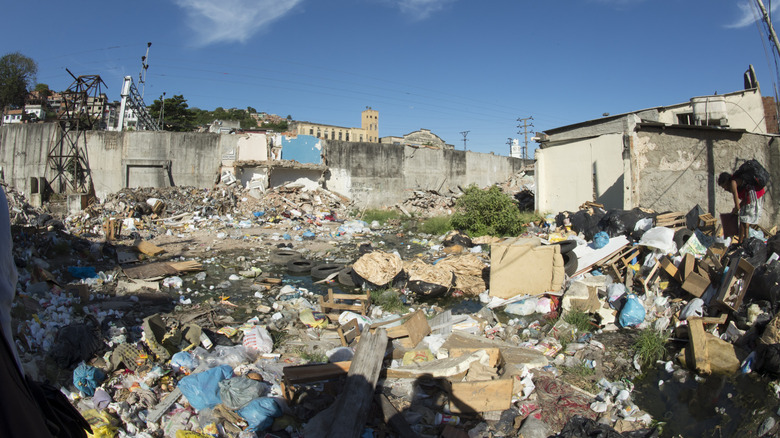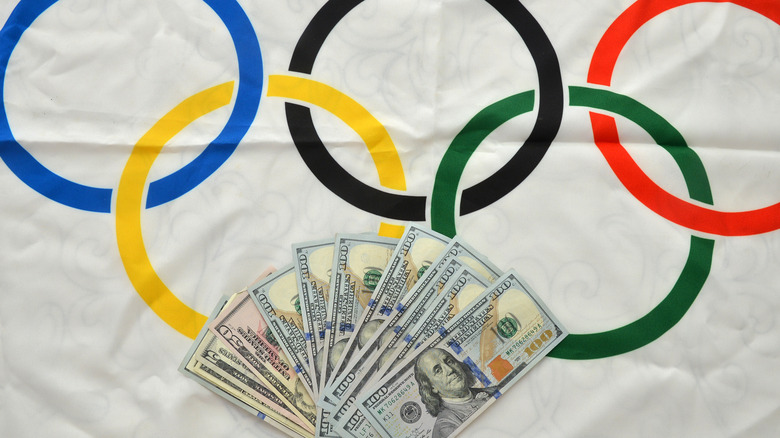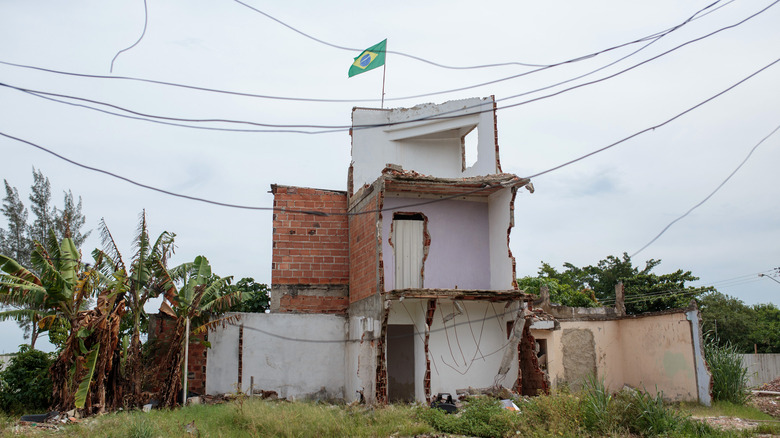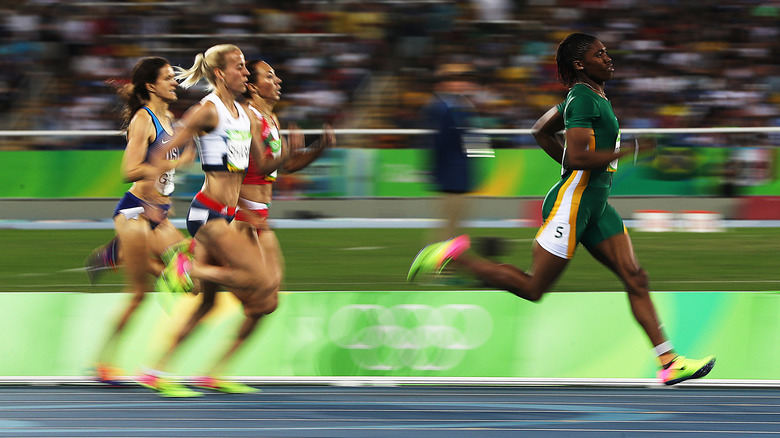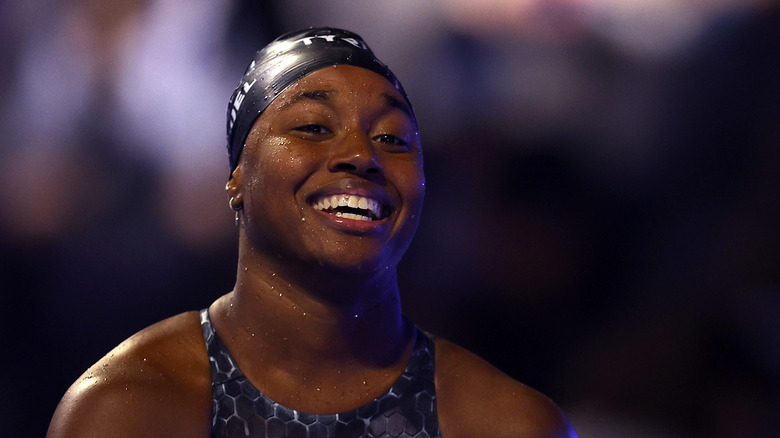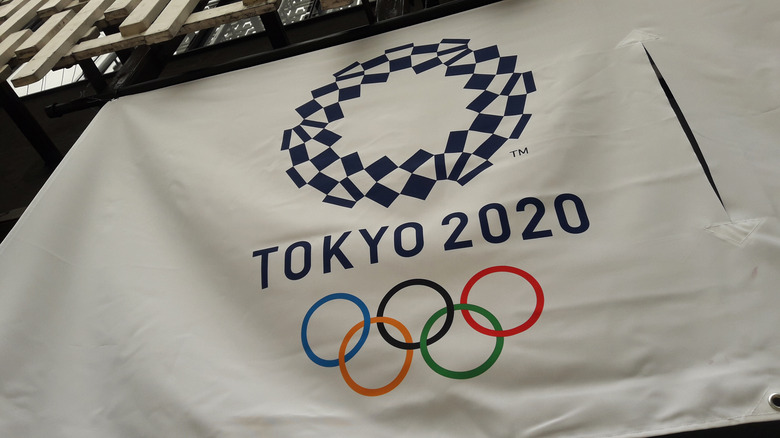The Controversial History Of The International Olympic Committee
Whether it's president Thomas Bach calling Japanese people Chinese, or members taking millions in bribes, the International Olympics Committee seems committed to being embroiled in controversial and corrupt scandals. The International Olympics Committee, also known as the IOC, has been involved in a number of controversies throughout its existence, and despite repeated calls for reform, the IOC remains a corrupt organization with little-to-no oversight or transparency.
With the 2028 Summer Olympics set to be hosted in Los Angeles, the NOlympics LA movement was launched by the Housing and Homelessness committee of the Democratic Socialists of America, and it has been campaigning against not only the withdrawal of the Olympics from Los Angeles, but the complete cessation of the Olympics Games due to the negative effects the events have on the residents of host cities.
Throughout its modern history, the Olympics has prioritized profits over people, to the point where the 1980 Olympics were held in Lake Placid because the Federal Bureau of Prisons paid for part of it in order to turn the resulting Olympic Village into a prison. Meanwhile, the International Olympics Committee continues to claim that they are "committed to improving the protection, promotion and respect of human rights." This is the controversial history of the International Olympic Committee.
Who was Pierre de Coubertin?
The founder of the modern Olympics, Charles Pierre de Frédy, Baron de Coubertin, also known as Pierre de Coubertin, was born in Paris, France on January 1, 1863. According to ThoughtCo, Coubertin decided that "his nation's lack of physical education for the masses" had a direct effect in France's defeat in the Franco-Prussian War, which happened when he was 8 years old.
Originally, Coubertin wasn't thinking of reviving the historical Olympic Games. All he had in mind was "merely to call for the development of sport in French secondary education and at university level," Patrick Clastres writes in "Playing with Greece." But after hearing a proposition about athletic events between foreign students, in 1892, Coubertin changed his pitch to revolve around "the promotion of international peace through sports." And instead of students, "the best amateur sportsmen" would be competing.
"Borrow[ing] from antiquity," Coubertin proposed the Olympic Games. And in 1894, he assembled 79 delegates from 12 countries to create the basic framework for the Olympic Games and the first International Olympic Committee.
The first modern Olympic Games were held in Athens in 1896, but the Games wouldn't achieve "the form that [Coubertin had] always imagined" until the 1936 Berlin Olympics. Coubertin was so enthusiastic both about the Berlin games and the Nazi regime that he advocated creating the International Olympic Institute in Berlin, and even donated his estate to the organization. Unfortunately, all the documents that Coubertin left behind were destroyed in 1943 during an air strike.
What is the International Olympic Committee?
Founded by Coubertin and Demetrios Vikelas on June 23, 1894, the International Olympic Committee is responsible for organizing both the modern Olympic Games and the Youth Olympic Games. Headquartered in Lausanne, Switzerland, the IOC is also responsible for governing the Olympics and is considered the "final authority," according to the Georgetown Law Library.
While the host country is in charge of organizing the Olympic Games, the IOC is responsible for choosing the host country. And although the 110 members of the committee come from various countries, many of which have hosted the Olympics, committee members do not represent their individual countries in the IOC. Instead, members "represent the IOC in their respective countries."
There have been eight presidents of the IOC, the most recent of whom is Jacques Rogge, from Belgium. Although the president of the IOC originally came from the country that was to host the upcoming Olympics, this rule was changed in 1896.
Membership is incredibly exclusive and self-contained. New members are nominated and elected by pre-existing members. Terms are eight years, but they are often renewed for life.
Throughout its lifetime, the IOC has been involved in a number of controversies ranging from corruption and bribery to racism and transphobia. It has been argued that the organization has "no real oversight."
The Salt Lake City bid
In late 1998, it was reported that members of the IOC had accepted a series of bribes in exchange for allowing Salt Lake City to host the 2002 Winter Olympics. According to the Guardian, those who were bidding for Salt Lake City to host the games gave IOC members "cash, travel, medical care and other lavish gifts" in an attempt to win the bid, ranging from straight cash to scholarships and plastic surgery.
Dick Pound, IOC vice-president at the time, led the investigation into the corruption and within two months, 14 members were sanctioned or expelled. Six members in total were expelled; Agustin Arroyo of Ecuador, Zein El Abdin Ahmed Abdel Gadir of Sudan, Jean-Claude Ganga of the Congo Republic, Lamine Keita of Mali, Sergio Santander of Chile, and Paul Wallwork of Samoa.
Marquette Sports Law Review reports that three members also resigned before Pound even finished his investigation: Pirjo Haggman of Finland, Bashir Mohamed Attarabulsi of Libya, and David Sibandze of Swaziland. In response to the scandal, the IOC created an Ethics Commission in 1999. However, in 2007, the provision "requiring the Ethics Commission to submit a report to the IOC on the application of the Code and any breaches it has discovered" was removed.
According to Deseret News, Salt Lake City bid leaders Tom Welch and Dave Johnson ended up being charged in the United States for fraud, conspiracy, and racketeering, but a federal judge threw out the charges in 2003.
Disregard for its own internal standards
The IOC has been found to have repeatedly "disregarded its own internal standards" when it comes to the management and creation of the Olympic Games. According to "Forced Evictions, Homelessness, and Destruction" by Leigha C. Crout, the sports facilities and venues used by the Olympic Games are supposed to be constructed with "harmonious integration into the local context, whether natural or man-made, and in accordance with considerate planning of land use." Instead, for the 2016 Rio de Janeiro Olympics for example, hundreds of families ended up being evicted for a new rapid transit link.
Part of the Metrô-Mangueira community was also evicted, and although some were rehoused due to "severe public resistance," homes were demolished and, according to Rio On Watch, the demolition debris was left behind. As of 2019, the debris was still there.
ICO rules also stipulate that the facilities should "improve the socio-economic and health benefits they derive from it," but instead during the 2016 Olympics, athletes became ill due to the poor water quality in Rio de Janeiro. Meanwhile, the IOC maintained that it would only test the waters for bacteria rather than bacteria and viruses, despite an Associated Press report "showing dangerously high levels of disease-causing viruses at all aquatic venues," according to CBS News.
Money is everything
Despite the fact that the International Olympics Committee is technically a non-profit organization, in addition to the millions that members can receive in bribes, the events are actually a billion-dollar industry. Business Insider notes that "the Olympics have little to do with sports. They're mostly about money." This also makes it convenient that the IOC is based in Switzerland, a tax-haven.
According to Play the Game, although future IOC contracts with host cities are changing, for the Tokyo 2020 Olympics, the IOC is paid, among other things, at least "7.5% of all cash payments from domestic sponsorship" and "7.5% of the ticketing and domestic hospitality revenue." And although the IOC is meant to pay host countries and subsidize the Olympics, the Olympics more often than not bankrupts the city that hosts it. After the 2016 Rio de Janeiro Olympic Games, the governor of the city declared a financial emergency.
For the 2016 Olympics, the IOC claimed that it contributed $1.531 billion, even though its own annual report from 2016 adds up to a contribution of $1.559 billion. Meanwhile, what was actually transferred from the IOC was $777 million. And all this is only known because in 2020, a leaked list of IOC contributions revealed to the public for the first time exactly how much the IOC actually pays to a host country.
Turning a profit at the expense of people
Financially insecure communities often have to pay the heaviest price of hosting the Olympics. Teen Vogue writes that for almost every Olympic Games, residents of the host city end up displaced. For the 2016 Rio de Janeiro Olympics, at least 60,000 people were displaced. For the 2008 Beijing Olympics, at least 1.5 million people ended up being evicted.
Ahead of the 2020 Tokyo Olympics, many people were also evicted. According to Reuters, for one resident in particular the experience felt like the most horrific déjà vu. Kohei Jinno, 87-years-old as of 2021, was first evicted from his family home during construction for the 1964 Tokyo Olympics. And in 2013, Jinno was evicted once more due to construction for the Olympic games. Jinno says that "there wasn't any consideration... Instead it was pretty much 'We're having the Olympics, you need to get out.'" And while residents were given $1,500 in compensation, it took most of those evicted at least $9,000 just to move.
During the financial emergency after the 2016 Rio de Janeiro Olympics, thousands of public clerks were forced to go without their paychecks and small suppliers also ended up having to go without payment, according to Play the Game. Meanwhile, the 1976 Olympics is described as leaving the city of Montreal "thoroughly broken."
With the upcoming 2028 Los Angeles Olympics, the city is already seeing the same "pattern of displacement and gentrification" (via Teen Vogue).
Policing bodies
The IOC started policing the genitals of athletes in the 1960s, and sex verification was always aimed more at women than men. According to the Journal of Law and the Biosciences, sex verification was introduced in order to reassure that Soviet men weren't competing as women "to increase the Communist medal count." The rules also seemed to "relax older and more cultural worries of masculinization of women in sports."
Initially, the verification process involved women "parading nude before a panel of doctors" but after complaints, the IOC decided to use a chromosomal test instead. This led to numerous women, like Spanish hurdler Maria José Martínez Patino and Polish sprinter Ewa Kłobukowska, to be banned simply because the test discovered that they had a Y chromosome.
In addition to being discriminatory, traumatizing, and stigmatizing towards intersex people, the IOC continued to insist that blanket testing for the Y chromosome was necessary. Although blanket testing was abolishing in 1999, sex verification continues in the form of testosterone testing.
Having decided on what counts as an acceptable amount of testosterone, the IOC continued to police women's bodies ahead of the 2020 Tokyo Olympics by banning Namibian track and field runners Christine Mboma and Beatrice Masilingi. According to the South African, this rule has in recent years targeted African women who simply did better than their competitors, like Caster Semenya from South Africa, Francine Niyonsaba from Burundi, and Margaret Wambui from Kenya, but it affects women worldwide, including India's Dutee Chand.
Swim cap discrimination
Since the International Olympics Committee is considered the final authority on all things Olympics, it would be incredibly easy for them to overturn the decisions made by the federations they recognize. And yet, when the International Swimming Federation (FINA) ruled that swimming caps designed to fit natural Black hair are not allowed at the Olympics, the IOC didn't say a word.
According to the Guardian, FINA claimed that the Soul Cap swim caps don't fit "the natural form of the head." They also claimed that to "athletes competing at the international events never used, neither require...caps of such size and configuration." This mentality only serves to restrict the participation of anyone who doesn't look like those who participated in the past
As Quartz notes, the refusal to recognize the swim caps follows a long history of racism in sports and swimming in particular. Throughout the 20th century, racist stereotypes included the idea that Black people's bones were "less buoyant."
This restriction also fits with the established practice of policing Black hair, especially that of Black women. And the Los Angeles Times reports that FINA only instituted a swimming cap ban after Simone Manuel became the first Black woman to win an Olympic gold medal in swimming in 2016.
The Russian doping scandal
Roughly one month before the 2016 Rio de Janeiro Olympics, 68 Russian athletes were banned from competing in the Olympics due to doping. According to SBNation, the ban was originally put in place in November 2015, and was extended and upheld in June 2016. The World Anti-Doping Agency (WADA) found that Russia had engineered a "massive, state-sponsored doping program." The BBC writes that the IOC decided not to give Russia a blanket ban from the Olympic Games and instead decided to leave it up to "individual sports' governing bodies." Ultimately, out of the 389 athletes listed by Russia, 278 were deemed eligible to compete.
The WADA criticized the IOC for rejecting its recommendation to ban Russia from the Olympics, stating that the decision would lead to "lesser protection for clean athletes." And with IOC's "confusing patchwork of conflicting and insufficient instructions" to the sport federations in regards to banning athletes, the IOC hindered a fair and transparent outcome.
In 2018, the IOC finally banned Russia from the 2018 PyeongChang Winter Olympics, though the athletes from Russia were able to participate as neutrals. In response, Russia "lashed out" at the WADA and the IOC, and both institutions were hacked by Russian hacking group Fancy Bears.
Repeated corruption
The IOC often seems synonymous with corruption. And as noted by the Maryland Journal of International Law, since the IOC works in an industry that creates risks for corruption, especially since public officials are often involved, one would expect it "to maintain an effective compliance program to prevent and detect potential misconduct."
In addition to bankrupting cities on their way out, the Olympics make their way into a city through a series of bribes and luxuries. According to FloTrack, when Norway was being considered for the 2018 Olympics, among a number of absurd requests, the IOC even asked the King of Norway to host a cocktail party for them, at his own expense. This despite the fact that, in theory, the IOC prohibits any of its members from receiving "any gift, of any value, from a candidate city." In 2016, former governor of Rio de Janeiro Sergio Cabral testified that he paid $2 million as a bribe to host the 2016 Olympics.
For the 2014 Sochi Olympics, the IOC also turned a blind eye to Russia bringing migrant workers into the country illegally to handle the construction and forcing them to stay by withholding their passports (via FloTrack).
Despite the fact that the IOC boasts of having an Ethics Commission, it has yet to speak out about human rights violations related to the Olympics. Human Rights Watch writes that in keeping with its usual practices, the IOC is failing to protect against human rights violations in China ahead of the 2022 Beijing Olympics.
Tokyo Olympics bribery scandal
The 2020 Tokyo Olympics wouldn't truly be the Olympics without some sort of bribery scandal. In 2016, the Guardian reported that in bidding for the Olympic Games, Tokyo payed upwards of $1.5 million to Papa Massata Diack, the former International Association of Athletics Federation (IAAF) marketing fixer. And in 2020, Reuters reported that Haruyuki Takahashi was paid $8.2 million by the Tokyo bid committee while lobbying International Olympic Committee members such as Lamine Diack. While it's not clear exactly what happened to the money, the Nation notes that "the Tokyo bid certainly looks suspicious."
This also isn't the first time that Japan was involved with bribing the IOC. When the city of Nagano was bidding for the 1998 Olympics, up to $22,000 was spent per IOC member on gifts, despite the fact that in 1991, a gift limit of $200 had been implemented by the IOC. Unfortunately, not much is known about the Nagano bid because after the 1998 Winter Olympics, the Nagano bid committee threw all their documentation into the incinerator.
